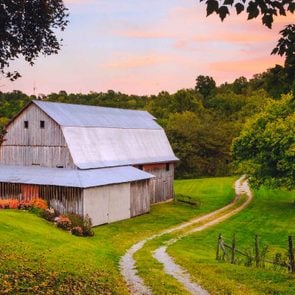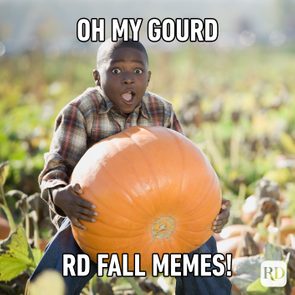Autumn vs. Fall: Why Americans Say “Fall” and Not “Autumn”
Updated: Jul. 26, 2024

Is it fall or autumn—or both? Here's what to know about using autumn vs. fall when talking about the season of pumpkin spice.
The air gets crisp, the leaves start to turn, and we break out our cozy sweaters. Of course, we are talking about the first day of fall—also known as the season of pumpkin spice and everything nice. But like the falling leaves and cooling temperatures, there’s a debate that happens every year: autumn vs. fall.
Although both refer to the same season, Americans tend to say “fall” more than “autumn.” Why is that, though? Is there some unspoken grammar rule we don’t know about? If fall is your favorite season (whether for the tart, crisp apples or autumnal foliage), you’ll want to know what we’ve learned about the word autumn vs. fall. Keep reading to find out the details.
Get Reader’s Digest’s Read Up newsletter for more seasonal tips, fun facts, humor, cleaning, travel, and tech all week long.
Is the correct term autumn or fall?
The pre-winter season of apple cider and colorful leaves goes by either autumn or fall. The words are synonyms.
Fun fact: Neither is the oldest term for the season. As Merriam-Webster points out, harvest is the earliest name, and it was in use before the 12th century. It led to some confusion, though. After all, harvest referred to both the time people usually harvested crops and the actual harvesting of crops. Autumn, a word dating back to the late 1300s, became popular as an alternative.
Where does the word fall come from?
The word fall likely stems from “the fall of the leaves” or “falling of the leaves,” phrases poets used, according to Merriam-Webster. People shortened the phrase to the single word fall in the 1600s. The English empire grew, followed by the eventual independence of the United States. From there, time, distance and new freedom contributed to the many differences in English spoken in America and Britain.
Who says “autumn,” and who says “fall”?

Fall is the word of choice in the United States, and autumn is the go-to in Britain. Although both fall and autumn stem from England, autumn was more widely used for a long time, though both have seen their popularity rise and fall. (C’mon, did you really think we’d pass on the pun?)
It wasn’t until the 1800s that American English and British English took unofficial stances on these words. It’s still unclear why America clings so strongly to fall. Some speculate it has to do with daylight saving time—as in “spring forward, fall back.”
Autumn vs. fall: Which one should you use?
Good news: It’s acceptable to use either autumn or fall when referring to the season filled with brightly hued trees and fun fall activities (like visits to the apple orchard and pumpkin patch). If you want to be more formal, you could choose autumn for both speaking and writing.
Why trust us
At Reader’s Digest, we’re committed to producing high-quality content by writers with expertise and experience in their field in consultation with relevant, qualified experts. We rely on reputable primary sources, including government and professional organizations and academic institutions, as well as our writers’ personal experiences where appropriate. We verify all facts and data, back them with credible sourcing and revisit them over time to ensure they remain accurate and up to date. Read more about our team, our contributors and our editorial policies.
Sources:
- Dictionary.com: “‘Autumn’ vs. ‘Fall’: What Was the Season Called First?”
- Merriam-Webster: “Is It ‘Autumn’ or ‘Fall’?”
- Writing Explained: “Autumn or Fall – What’s the Difference?”























